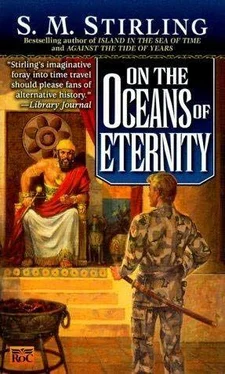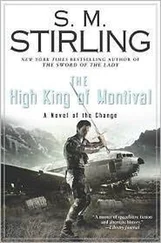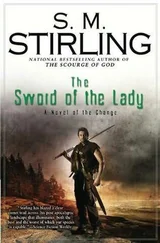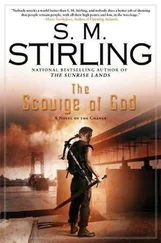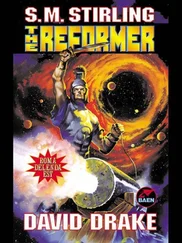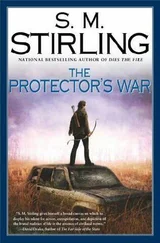"I'm sorry, ma'am," Hiller said.
The longboat pitched easily, the crew leaning on their oars. The Great Harbor of Syracuse stretched around them, most of the shore swampy and noisy with duck and flamingos and spoonbills, adding a silty smell of marsh to the clean salt breeze. Water shone blue-purple, shading to emerald over shoal and sandbank. The Islander fleet was further away from the enemy guns, anchored in neat rows with a busy commerce of small craft and rafts shuttling back and forth to shore.
"We hit a mine, that's all I can say," Hiller went on. "Hit a couple, but the first two were duds. The third wasn't, and it blew a hole just back from the bows you could drive an oxcart through. It's a miracle we got most of the engine-room gang out."
Marian nodded; she knew what the words hid. The sudden inrush of water, like a wet avalanche down a hull with no interior bulkheads. The crew struggling up the ladders in darkness, with the roar of water and the toning sounds of the boilers' self-destruction all around them as cold sea met hot steel…
"Lucky it was shallow and not many of their guns bore on it," he said.
"Not really luck; that's why they put the mines there."
In another history, during the eighth century before Christ, settlers from Corinth would have landed on the island they called Ortygia, and founded the city later known as Syracuse. Here it had been the seat of a local chief, until William Walker led Achaeans spearheaded by his rifle-armed troops here to conquer. The fortifications had probably started right away, and judging by the piles of stone were still going on. As she watched a ripple of smoke puffs ran along one of the slanting walls. Seconds later the dull flat booommm of heavy cannon came, and water began to gout skyward in columns of green and shattered white near the grounded ironclad. That was a small target, only the casement showing above the surface. Seconds later the ship's own broadside guns replied, their rifled barrels giving them a harder, sharper bark. Stone shattered where they struck and avalanched downward. Then the long forward six-inch gun fired, sending its heavy shell past the island and into the town proper.
"Eleven-inch Dalghrens," Killer said. "We get ammunition and supplies to the Eades at night in small boats, and volunteers, and bring others out for rest. So far she's given as good as she's got, but eventually they'll pound her to pieces, since she can't move. Quicker, if they get that damned heavy mortar moved…"
Alston's eyes went to the civilian settlement around the head of the causeway. That was fortified as well, excellent low-slung works behind a deep moat and glacis. The Islander artillery on the heights of Epipolai beyond still bore on the city below, the distant slamming-door sound of its firing echoing across the water. Then came the long whistling fall, and another tall billow of pulverized adobe, timber, stone, and people. They were densely packed in there, too; Achaean colonists had fled here from all the province around. Crowds of Sicel natives and slave rebels sprawled near the orderly tent-rows and earthworks of the Republic's Marines.
"Not a problem, if… there," Alston said, looking down at her watch.
A rocket went up from the fortress on Ortygia, bursting green. The same signal came up from the Islander works ashore, and from the bridge of the Farragut , where she patrolled off the line of anchored frigates and transports.
"Head us in for the landing grounds, if you please, Mr. Hiller."
Her command tent wasn't big enough for the delegates this time; they met on a piece of sloping ground. They'd all agreed to come unarmed, trusting to Alston's reputation for keeping strictly to the terms of agreements. Nantucketer Marines separated the three parties, Achaeans and native Sicilians and uprisen slaves.
Although the Achaeans look like they need protecting from each other , Marian noted with cold amusement as dagger glances went back and forth. Not really all Achaeans, either; lot of Walker's mercenaries are from all over .
Walker's viceroy had been one of his original followers. Danny Rodriguez's body still hung from the gallows at the edge of camp, but he'd been dead when the Marines caught him, stabbed by a member of his hareem.
Even divided as they were, the Achaeans were a miracle of unity compared to the Sicels. The slaves were as numerous as both the other groups put together, but even less organized. Still, the month of fighting had thrown up some natural leaders…
"Greetings," she said.
An interpreter put that in Achaean, and all the respective groups had at least one person who could turn that into whatever.
"We are all come here under sign of truce to arrange an end to this war."
One of the Achaeans shot to his feet. "The King of Men will put an end to the war, and to you invaders!"
Alston put her hands on her webbing belt. "He hasn't shown much interest in doing so," she replied dryly. "His armies are in the Hittite lands, and his fleet is keeping to its bases, to defend his seat of power and his palace. He has abandoned you."
The Achaean snarled; he was wearing the remains of Walker's gray uniform. Some of the other Greeks around him nodded, though.
Ah. Doreen was right.
The problem with tying down a conquest by land grants was that it gave the settlers a vested interest. They'd fight to defend it, yes… but they'd also negotiate to defend it, if fighting didn't look too successful. These men had families and farms and homes to think of; and the first gruesome results of the uprising that had accompanied the Islander invasion were enough to make anyone thoughtful.
A Sicel chief rose next, a lean brown little man in a loincloth and cloak of goatskin, with long tangled black hair. His folk looked a lot like Tartessians, in a primitive sort of way, and spoke a language related to the Iberians'-about as close as Italian would be, would have been, to Spanish.
"Why should we talk peace when the invaders still stand on the Lady's holy soil? Let them get gone, or die." His eyes moved over to the slave rebels with whom he'd found himself in uneasy alliance. "The ones they have brought here, they can go, too."
Shouts and threats boiled free. Not many of the slaves had anywhere to go. Either their homes had been overrun by Walker's men, or they'd been sold by hostile neighbors not interested in seeing them back.
Marian waited a moment, then nodded. Swindapa picked up the powered megaphone and held the microphone near the output diaphragm. Feedback squeal stabbed into ears; forewarned, Marian kept her response to a slight flinch. Overhead the Liberator plowed the air in a slow circle, vastly more intimidating to eyes that didn't know how much of her bulk was fabric and gasbag.
"Silence!" she said into the quiet that followed.
A strong earthy smell came up the hill to her, and a reek of fear sweat. Most of these men had been fighting for weeks now, and going in terror of their lives-of seeing their womenfolk and children raped or burned alive before their eyes, as well. It showed; and their nerve wasn't what it might have been either.
"You-" She pointed to the Sicel. "Dakenterar. Your people are no longer numerous enough to hold this island by themselves. The Achaeans are as many as you, and their slaves twice as many."
Those were the proportions the Intelligence people had gotten from Foreign Affairs; the Arnsteins' numbers were pretty reliable. Of course, the whole population was a good deal smaller than it had been a month ago, but the reductions seemed to have been roughly similar all 'round.
"You Achaeans," she said. "If you continue to fight us, you can't hope to win. A few forts may hold out, but most of you will die; and even those who live will lose everything." She smiled unpleasantly. "We have a saying: If you want to know the enemies in your household, count your slaves ."
Читать дальше
